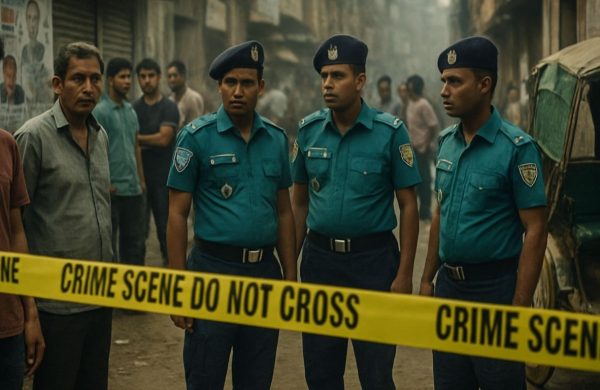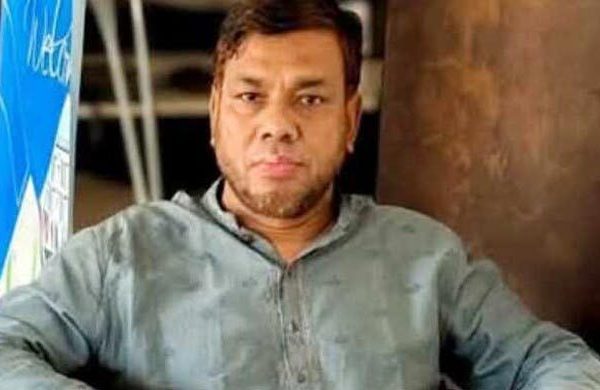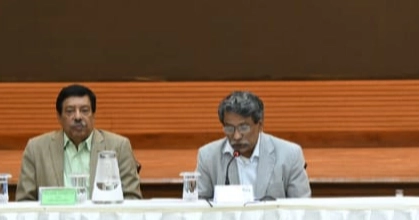Spike in murders, extortion and terror raises alarm
- Update Time : Thursday, July 31, 2025

TDS Desk:
Despite efforts by law enforcement agencies, the country continues to witness an alarming surge in murders, terror activities, and widespread extortion.
From bustling city centres to remote upazilas, criminals are operating with impunity—killing in broad daylight and demanding extortion money from citizens across all professions, particularly targeting business owners.
Victims, gripped by fear, often refrain from reporting incidents, fearing fatal retaliation. In many cases, extortionists pose as “coordinators” of community or development projects to extort money. On 27 July, police apprehended a group of young men in the capital’s Gulshan area while they were allegedly collecting a second instalment of extortion posing as such “coordinators”.
Following their arrest, further details have emerged pointing to the spread of such syndicates outside Dhaka. That in district including Narsingdi and Mymensingh, killings have occurred even when victims failed to meet extortion demands.
This growing menace has triggered protests across the country. Victims and concerned citizens have taken to the streets, staging human chains and demonstrations to demand protection and accountability.
From Mohammadpur in Dhaka to Savar, Jhenaidah, Mirsarai, Mymensingh, Ashulia and Chattogram, various social groups—including teachers, transport workers, and even the visually impaired—have spoken out against the climate of fear created by extortion and the apparent breakdown in public safety.
A GRIM MURDER TOLL
According to police data, 3,857 murder cases were filed across the country between July 2024 and June 2025. Of these, 410 were related to previous incidents dating as far back as 2009. Excluding older cases, an average of 288 murders occurred each month over the past year—up from 256 per month during the January–June 2024 period.
The Dhaka Metropolitan Police recorded the highest number of cases among metropolitan units, with 480 murders. The Dhaka police range topped the list among regional units, with 903 cases filed.
Analysts say the data reflect a concerning deterioration in the law and order situation, with enforcement agencies apparently unable to reassert control over rising violence.
DMP Commissioner Sheikh Md Sajjat Ali said police remain vigilant and are actively working to curb murder and other crimes. “Law enforcers are arresting suspects and bringing them to justice,” he added.
Police Headquarters spokesperson Assistant Inspector General (AIG) Enamul Haque stated that each case is being thoroughly investigated and that arrests are being made regularly.
Analysts attribute the rise in killings to political feuds, land disputes, drug-related conflicts, and extortion-related turf wars.
Among the incidents that shocked the nation, the daylight killing of businessman Md Sohag—also known as Lal Chand—near Mitford Hospital in Old Dhaka on 9 July sparked widespread outrage. In another brutal case on 28 May, a couple—Nazmul Hasan Pappu and his wife Dolna—were stabbed to death in Mirpur. In May alone, two more killings occurred in Badda: contractor Anwar Hossain was murdered on the 8th, and BNP leader Kamrul Ahsan Sadhan was shot dead on the 15th.
According to analysts, many of these murders could have been prevented with stronger intervention from law enforcement. “Each killing leaves irreparable trauma for families. Unless immediate and firm measures are taken, the trend is unlikely to be reversed,” one crime expert said.
A review of 217 killings reported in Dhaka over the last six months shows a significant number were politically motivated.
NATIONWIDE OUTCRY
On 30 July, more than 70 educational institutions took part in a protest under the banner of the United Teachers’ Society in Mohammadpur-Adabor. Teachers, students, and guardians formed a human chain and staged a procession demanding action against extortionists. Organisers claimed schools and colleges are being targeted and that those who protest face threats from local criminal elements.
The previous day, over 400 visually impaired individuals demonstrated on the Savar–Birulia road. Organised by the National Organisation of the Visually Impaired, the protest alleged that shop owners in the ‘Ondho Market’ were being extorted, with some shops even being seized or shut down.
Speaking to journalists, AIG (Media) Enamul Haque Sagar said, “The government has adopted a zero-tolerance policy against extortion. Strict instructions have been issued by the home adviser, and law enforcement agencies are stepping up their operations to ensure public safety.”
Intelligence sources confirm that a comprehensive list of known extortionists is being prepared nationwide—down to the ward level. The list, which includes names of top criminals, will be submitted to relevant ministries to facilitate coordinated crackdowns.
In Jhenaidah, hundreds of people formed a human chain at the Bypass intersection on 12 July, saying extortionists were now demanding money door-to-door. “Refusal invites threats, harassment, or worse,” said one protester.
One of the largest fisheries in the country, located in Chattogram’s Banshkhali area, is reportedly under the control of extortionists. On 21 June, fish farmers and local residents held a protest alleging intimidation, theft, and even poisoning of fish when payments were not made. They claimed such harassment intensified after 5 August last year.
On 17 June, the Mymensingh Clinic and Diagnostic Owners’ Association held a protest in the Charpara area. Vice-president Shamsuddoha Masum said extortionists demanded money from a private hospital owner, later assaulting him and vandalising the facility when he refused.
On 23 June, traders and transport workers formed a human chain in Ashulia’s Baipail area, demanding the swift arrest of known extortionists. Similar scenes were witnessed on 18 May at Chattogram’s Shah Amanat Bridge, where transport workers alleged they were being forced to pay daily bribes, and those who refused were assaulted.
As frustration mounts and public protests grow louder, the pressure is now squarely on authorities to deliver more than words—to dismantle the criminal networks tightening their grip on the streets, and to restore the public’s shaken confidence in the rule of law.















